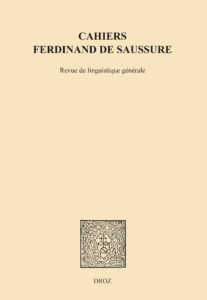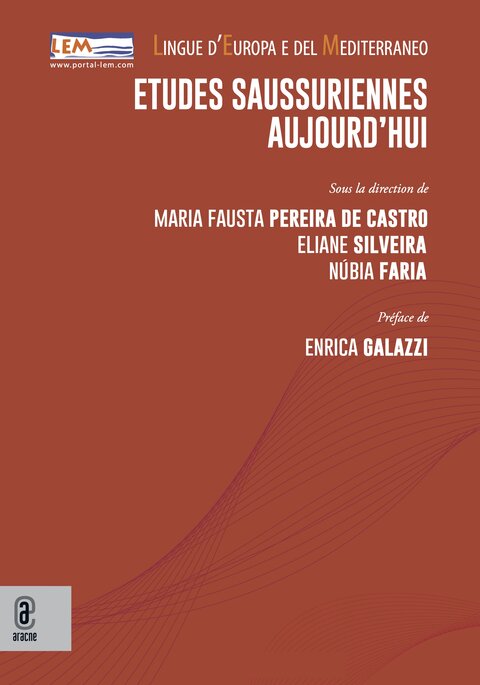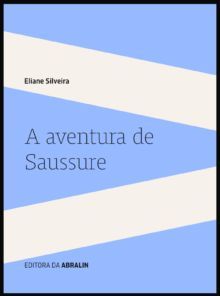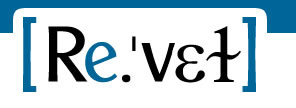Cahiers Ferdinand de Saussure. Volume 74 (2021), édité par Pierre-Yves TESTENOIRE, Genève, Librairie Droz, 2022, 328 pages, ISSN : 0068-516X, ISBN-13 : 978-2-600-06414-9, € 60,00 / CHF 61.50
Date de première publication : 05 Décembre 2022
Voir la notice de l’Éditeur.
Ce numéro en version numérique : https://revues.droz.org/index.php/CFS/issue/view/CFS74
Table des matières
I Éditorial
À nos lecteurs (P.-Y. TESTENOIRE)
II Articles
Grazia BASILE, Le phénomène de la synonymie entre système linguistique et infinité. Saussure et Bally en comparaison
Felice CIMATTI, Saussure on the odd and unconscious nature of language
Rossana DE ANGELIS, La sémiologie à l’école de Genève
Emanuele FADDA, La syntaxe sémiologique de L. J. Prieto: une théorie de la connaissance des objects composés
Anne-Gaëlle TOUTAIN, La place de la syntaxe dans l’oeuvre de linguistique générale de Ferdinand de Saussure
Klaas WILLEMS, Saussure on synonymy
III Résumés de thèses
Aline VARGAS STAWINSKI, À l’écoute de la langue-parole: considérations à partir de la théorie saussurienne
IV Documents
Pierre-Yves TESTENOIRE et Simon WILLEMIN, Ferdinand de Saussure dans les archives de Jean Starobinski
Pierre-Yves TESTENOIRE, Raymond Queneau. Saussure, hétéroclite ?
Lucia AMARA, La traduction italienne des Mots sous les mots. Une version augmentée
Pierre-Yves TESTENOIRE et Simon WILLEMIN, Bibliographie de Jean Starobinski sur les anagrammes de Saussure
V In Memoriam
E. F. K. Koerner (1939-2022) (John E. Joseph)
VI Lectures critiques
La Grande Grammaire du français, sous la direction d’Anne Abeillé & Danièle Godard, en collaboration avec Annie Delaveau & Antoine Gautier, 2 tomes, Arles, Actes Sud, 2021, par Alain BERRENDONNER
La sémantique au pluriel. Théories et méthodes, A. Biglari, D. Ducard (éd.), Rennes, Presses Universitaires de Rennes, 2022, par Michele PRANDI
VII Comptes rendus
Claudia MEJÍA QUIJANO, El primer curso. Lingüística general de Ferdinand de Saussure, Louis Caille y Albert Riedlinger, edición bilingüe de Claudia Mejía Quijano, Daniel Jaramillo Giraldo y Alexander Pérez Zapata, Medellín, Editorial Semsa, 2019 (E. Sofía)
François VINCENT, Ferdinand de Saussure : le premier cours de linguistique générale. La trilogie achevée, Deauville,
Éditions Champs-Élysées, 2020 (P.-Y. Testenoire)
Gilles SIOUFFI, Le sentiment linguistique chez Saussure, Lyon, ENS Éditions, 2021 (G. Basile)
Vladimir do NASCIMENTO FLORES, Saussure e a tradução, Brasília, Editora UnB, 2021 (G. M. Monteiro de Carvalho et M. de Fátima Vilar de Melo)
Roman JAKOBSON, Lo Sviluppo della semiotica e altri saggi, saggio introduttivo di Umberto Eco, saggio conclusivo di Nunzio La Fauci, traduzioni di Andrea La Porta, Emilio Picco e Ugo Volli, Bompiani, Campo aperto, 2020 (M.-J. Beguelin)
Cosimo CAPUTO, Basi linguistiche della semiotica: Teoria e storia Milano – Udine, Mimesis, 2021/La scienza doppia del linguaggio. Dopo Chomsky, Saussure e Hjelmslev, Roma, Carocci, 2019 (M. Servilio)
Michel BOSSÉ, Le legs de F. de Saussure : tremplin ou boulet ? Analyse épistémologique des propositions linguistiques de Lev S. Vygotski, Jean Piaget et Jean-Pierre Changeux, Saint Lambert (Québec), Éditions Cursus universitaire, 2019 (J.-P. Bronckart)
Maurice MERLEAU-PONTY, Le problème de la parole : Cours au Collège de France, Notes, 1953-1954, texte établi par Lovisa Andén, Franck Robert et Emmanuel de Saint Aubert, avant-propos de Lovisa Andén, postface de Franck Robert, Genève, MētisPresses, 2020 (J. E. Joseph)
Tomáš KOBLÍŽEK, La conscience interne de la langue. Essai phénoménologique, avec une préface de Claude Imbert, Limoges, Lambert-Lucas (coll. « Philosophie et langage »), 2021 (S. Badir)
VIII Chroniques du Cercle
Chronique du Cercle pour les années 2021-2022
Résumés
Grazia BASILE (Université de Salerne) Le phénomène de la synonymie entre système linguistique et infinité. Saussure et Bally en comparaison
Abstract: The aim of this paper is to describe the phenomenon of synonymy as
understood by Ferdinand de Saussure and Charles Bally. As regards Saussure we find semiotically relevant suggestions both in the Cours de linguistique générale and, more strongly, in the Item Notes. By pointing out some of the content differences between these two attempts at writing, the Écrits de linguistique générale. In particular, in De l’essence double du langage (essay contained in Écrits) the notion of synonymy is correlated both to that of “negative synonymy”, in reference to the oppositional and negative character of linguistic elements within a linguistic system, and to that of “infinite synonymy”, in reference to the incalculable domain of possible senses with which we can reformulate the meaning of a word according to the contexts, in the various jeux de signes (sign manipulations) in which speakers are involved. The infinite synonymy and the theoretical necessity of contextual reference, together with the reference to the jeux de signes, are also present in Charles Bally’s subsequent reflections, in particular in his notion of “expressive molecule” as a system of facts of expression grouped coherently around a given idea. Among these facts of expression there are also synonymic expressions that play an important role in the
establishment of the science of expression, and more precisely of stylistics.
Keywords: Synonymy, Homonymy, Lexicon, Associative relationships, Stylistics.
Retour à la Table des matières
Felice CIMATTI (Università della Calabria), Saussure on the odd and unconscious nature of language
Abstract: As Starobinski explicitly showed, Ferdinand de Saussure discovered that language has its own semantic power which largely exceeds those of speakers; that is, Saussure discovered that language exists as an (almost) autonomous entity. According to this discovery language is not mainly a means of communication at the service of human beings, it is quite the contrary: human communication is a sort of collateral effect of language, because language does not exist only with the aim of allowing humans to communicate. Saussure discovered the existence of a somewhat mysterious semiotic life under the surface of natural languages, a “life” that is completely independent in respect to conscious human communicative needs. The psychoanalytical consequences of such a discovery will be explored through the Lacanian notion of lalangue
Keywords: Starobinski, anagrams, Chomsky, Lacan, lalangue.
Retour à la Table des matières
Rossana DE ANGELIS (Université Paris Est Créteil) La sémiologie à l’école de Genève
Abstract: The term semiology is unanimously attributed to Ferdinand de Saussure. Conceived as an autonomous field of research, semiology is presented as deriving directly from his lectures. Nevertheless, it is not seen as a field of research which has led to the creation of a real school (such as the School of Paris), nor to the instituting of a specific object of analysis. However, a semiological “legacy” stemming from Saussure’s proposals has consolidated. Protagonists of this legacy are Éric Buyssens, Luís J. Prieto, Georges Mounin, and Jeanne Martinet. To understand how their different semiological projects relate to one another, we must go back to the sources. That the definition of “semiology” presented in the Cours de linguistique générale developed across different phases of Saussure’s thought can be seen in the various senses in which it is used. This article examines the meanings which “semiology” has for Saussure and for those scholars who subsequently took it up.
Keywords: Semiology, Geneva School, Buyssens, Prieto, Mounin, Martinet.
Retour à la Table des matières
Emanuele FADDA (Università della Calabria) La syntaxe sémiologique de L. J. Prieto: une théorie de la connaissance des objects composés
Abstract: The article revisits a proposal by Luís J. Prieto for the (re)definition of syntax, dated 1988-1989. Prieto’s idea deserves to be reclaimed for multiple reasons: the resemblance of what he calls “phonological syntax” with what is called today “prosodic phonology”; the way in which it helps to understand the Hjelmslevian principle of biplanarity (heteroplane function); and, most of all, its semiotic value, which goes beyond the strictly linguistic level and makes it a fundamental notion for a semiotic theory of knowledge.
Keywords: L. J. Prieto, Syntax, Semiotics, Prosodical Phonology, Theory of Knowledge.
Retour à la Table des matières
Anne-Gaëlle TOUTAIN (Université de Berne) La place de la syntaxe dans l’oeuvre de linguistique générale de Ferdinand de Saussure
Abstract: This article attempts to determine the implications for syntax of the Saussurean definition of langue as a functioning. The deconstruction of the traditional representation of syntax is coupled with a redefinition of syntax within the framework of syntagmatic/paradigmatic and concrete/abstract entities distinctions. Syntax is elaborated as an “external determinant”, and as such it occupies a central place in Saussurean theorization of langue. This is both a point of convergence and a point of radical divergence with Chomskyan theory, a divergence which this article aims to highlight in order to propose, a bit speculatively, another answer to the question of the origin of language.
Keywords: value, system, functioning, Chomsky, psychoanalysis, phylogeny.
Retour à la Table des matières
Klaas WILLEMS (Ghent University) Saussure on synonymy
Abstract: Saussure’s observations on synonymie in De la double essence du langage (Saussure 2011) cast an interesting light on his general account of linguistic meaning. Synonymie covers three distinct concepts for Saussure: 1) semantic similarity of words in a particular language, based on the contrasts between (and mutual demarcation of) meanings in the lexicon, 2) semantic identity of different words in a particular language, by definition impossible in natural language, and 3) multifunctionality of a word in a particular language, to be understood in terms of a hierarchical relationship between a word’s encoded language-particular meaning and its instances of use (including figurative uses). As well as tracing the connections between these three concepts, this article calls attention to the internal consistency of Saussure’s explanations and underscores their importance for a coherent and unified approach to the linguistic sign in accordance with Saussure’s basic theoretical assumptions.
Keywords: synonymy, polysemy, multifunctionality, metaphor (figurative language),
meaning, “signifié” (signified).
Retour à la Table des matières
Aline VARGAS STAWINSKI (Universidade Federal do Rio Grande do Sul) À l’écoute de la langue-parole: considérations à partir de la théorie saussurienne
Abstract: The aim of this thesis is to outline a conception of listening based on Saussurean linguistics. We take the role attributed to the ear and the speaker into account, in conjunction
with the notions of langue and parole. To such an extent, we organize this thesis into three parts. Each one focuses on a different topic – although all of them are correlated: the listener, the speaker, and the listening. Under the effect of Saussure’s approach on langue, we conclude that listening operates as a linguistic interpretation function capable of bringing the langue-parole dichotomy into question.
Keywords: Listening, Speaking subject, Ear, Listener.
Retour à la Table des matières






